







 |
 |
 |
 |
 |
 |
 |
 |


 251
252
253
254
255
256
257
annual 17
258
259
260
261
262
263
264
265
266
267
268
269
270
271
272
273
annual 18
251
252
253
254
255
256
257
annual 17
258
259
260
261
262
263
264
265
266
267
268
269
270
271
272
273
annual 18

Summary
In 1983 Reagan played "Russian roulette": his ultra-expensive "Star Wars
Initiative" would either bankrupt the Soviet Union or force them to
take desperate measures. In hindsight it worked, but it was a gamble for
the future of America and the world.
Likewise, in the FF Reed stared into the abyss: it was his "to be or not to be" moment. As with Hamlet, readers must decide if he is mad or sane?
Quick issue summary

Why now?
Reed has rescued Galactus, who is about to destroy the Skrull Throne
world. The Skrulls and Shi'ar just sent a warning. So Reed has to
escape. But is escape possible? Is this an unconscious suicide attempt?
The Fantastic Four works on multiple levels. The surface level is feel-good escapism. So the dark side is usually hidden. But it's always there.
Suicide is a common theme.

Ben attempts suicide in FF297.

But these were very depressed people, not like Reed, right?
Well ask yourself this question: if person A causes person B to be injured, who will hate himself the most? A or B?

Reed always takes responsibility for everything. Unlike Ben, who in most
ways has a very healthy psyche, Reed is an idealist. He has no place for
his own weakness. Any outsider would say that highly strung Reed is far
more likely to be self hating than easy going Ben.
Reed is so intelligent that he finds it hard to connect to other people. Other people do not understand him. We don't know what is going on underneath the surface. Separation from others is another risk factor for suicide.
When Reed fails he blames himself. He cannot cope. He becomes violent with himself:

Note that last frame: when he calms down he just internalizes it. He
still has the same conclusion: there is "no point" in others' solutions.
Most of this web site charts Reed's emotional progress. Crucially
Reed never changes his attitudes. The internal crisis was still there,
unresolved.
OK, back to the suicide motif. It's there throughout the 28 year
story, if you look for it. Probably the most popular FF story of all
(FF51) ends in suicide.

Note that the guy could attempt to jump after Reed, but he chooses not to.
Later when Reed's duplicate chooses a noble suicide, he does it by entering the Negative Zone. Note that this is deliberate suicide: he actively prevents the others from saving him.
Another noble suicide is Herbie: Reed said Herbie was just a machine but Ben realized he was more than that.
The Negative Zone is the go-to pace for suicide, especially for
people who look and think like Reed. The name "negative zone" says it
all. It is ruled over by Annihilus, "the living death that walks".
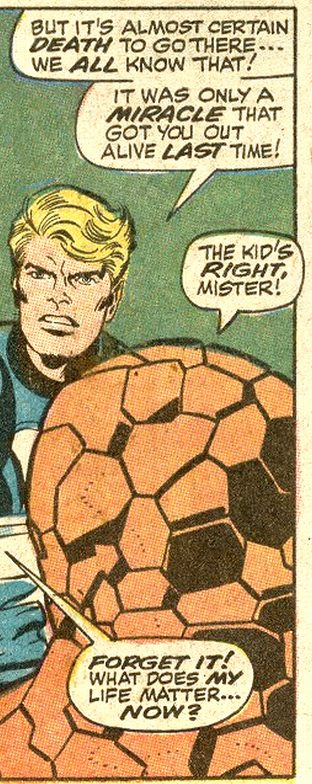
So that's the context. We have seen Reed's growing despair throughout Act 4. Now let's look at what he does in FF 251.
By FF251 Reed has failed at everything.
Doom is back, he can't protect his son from abuse, his
mistakes almost killed his family, and so on. Over the last 6
to 12 months (i.e. since 200) the rate of failure has
increased. Why does Reed not talk about it? Because his self
image depends on being in control. Reed has always kept huge
secrets, right from the Planet X story (FF7). Why does he not
look miserable? He only looks miserable when he doesn't have a
plan, as when Sue left him, or when he failed to stop the
Skrull Aging ray. (Also from a practical viewpoint, new
readers would not buy the comic if Reed spent every issue in
despair, and kept talking about: Marvel discovered that in the
divorce story.)
He sees his family in
similar despair.
Sue realizes that their lives cannot go on like this (e.g. in
FF223, 224, 227, 229-231, and her desperate and failing
Stepford Wife gambit). He realizes that he will always fail to
cure Ben (FF239,244), and Ben is never at peace (FF249), and
it's is all Reed's fault. Finally, it must seem to Reed that
Johnny can never find happiness in the team (e.g. FF244). He
sees his family as trapped and (under the surface) as
miserable as just as he is.
He freely chooses "almost
certain death."
So he decides to take them on an extended trip to the negative
zone, a.k.a. "almost certain death" (see FF annual 6). When
any sane person enters the negative zone (which you never do by choice) your
number one goal is to get out as quickly as they can - if you
can! Your number two goal is that nobody sees you because they
will try to follow you back and kill you. The negative zone is
not something you visit unless have no choice, or you want to
die!
His goal? A long, slow trip
to see what they can find.
This is not just a short trip like before, when they had no
choice, and tried to hide, and barely escaped with their
lives, but a long, extended trip, to see what they can find! And you know what
they always find in the negative zone? Annihilus, who wants to
kill all that lives, especially the FF! Blastaar, the
murderous living bomb! Stygorr, who's goal is to kill anyone
who invades his realm!
He removes all locks and
barriers!!!
Reed tells Ben that he his new design "eliminates the need"
for locks and barriers! No locks and barriers!!!
He creates Hell's bottomless
pit.
For this special journey he has created the new easy-access
entrance in the form of a great pit that leads down to the
realm of death (literally: the realm is ruled by Annihilus,
"the living death who walks.). The Biblical symbolism should
be obvious: the negative zone is Reed Richards' version of
hell, a realm of demons and death. Reed has created the great
bottomless pit, the abyss spoken of in Revelation, and plans
to jump straight down there and take his family with him. It
is probably just coincidence that Reed's new vehicle looks
like a highly ornamental crucifix (shown diagonally, but the
writing encourages the reader to rotate the page) and it then
closes up in the shape of a coffin.
He makes sure he can't be
rescued.
The majority of times that Reed has gone there, he ends up
trapped! And then he usually relies on the other team members
to rescue him from this side. So this time, for the first time
ever, he's taking them all with him!
He leaves Franklin
unprotected.
In FF249, the previous adventure, an enemy just blasted a hole
in the side of the Baxter Building and Spider-man could just swing on
in. So now Reed leaves Franklin with Alicia there!. Alicia is blind and
un-powered. Ben alerted Reed to the
fact that Annihilus is a very great danger. Reed must know
that Annihilus has a special interest in Franklin. So Reed
leaves Franklin unprotected by the entrance to the Negative
Zone! Why Franklin? Galactus is Franklin's herald. If Galactus unleashes
the wrath of the galaxies on Reed the Franklin has no hope. At least
Annihilus would make it quick. But the goal of the Skrulls and Shi'ar
would be to make the guilty suffer. And remember that although Franklin
slows down time (allegedly), beneath it all, Franklin is an adult and would be tried as an adult. He hides in a child's form, but don't let that fool you.
He notices something going
the other way, but does not care!
As they leave, Reed notes that something powerful may have
come back in the other direction: something from hell may be
heading back to his home. Statistically, based on past
experience, it is most likely to be Annihilus. He does not
seem to care!
When deep inside the zone he
acts like he wants to die.
See commentary to FF254 and FF256. Time and again Reed behaves
erratically, as if death is always his goal.
The reason he gives for
visiting makes no sense.
Reed says he wants to explore its "endless wonders." Reed must
have a zillion things to explore, and all of them are less
dangerous than the negative zone, so why choose that?
Obviously he has some free time. Then may I suggest a higher
priority: His own son! His son who can potentially destroy
galaxies (see FF 141). Whatever he can learn from the negative
zone is nothing compared to that. And Franklin has the power
of Annihilus' cosmic control rod in his blood, so by studying
Franklin you get to know the neg zone at the same time. And
apart from the scientific reasons, the parental duty reasons
and the save-the-world reasons, there is the little matter of
a promise. Reed said in issue 229, regarding Franklin's
powers, "I'll never stop
pursuing the problem until I've resolved it."
Whatever happened that that promise?

Sue is not entirely innocent either: this is what she said just before leaving Franklin: "the Baxter Building is no place for a normal child."

Then what did she do? She abandons him in the Baxter building!!!!
Any claim of innocence is lost at this point. She knows better. The Negative Zone visit was not necessary.
As for the ideal home for Franklin, Sue is correct that the Baxter Building is no place for a normal child, but Franklin is not normal, he is superhuman. Also, Franklin has never been in danger because of being in the Baxter Building (it's one of the best protected buildings in the world). He has only ever come to harm because his parents neglected him: at least two of his attacks were because they gave Agatha Harkness privileged access as a nanny instead of raising Franklin themselves.
Then, in an act of what can only be madness, Reed recently removed the only defenses Franklin had. What was Reed thinking??
And still Reed does not keep his promise made in FF229 (to find
out about Franklin's powers as his top priority). Until Reed keeps
his promise, Franklin will not be safe and neither will the team.
But neither Sue nor Reed are thinking clearly at this point: we
are nearing the end of Act 4, and everything is going wrong.
The zeitgeist,
and a world's first
The 1980s saw a growing awareness of homosexuality in the
media.
"I was once told by a gay friend of
mine (and I can't find where he cited this from originally) that
Fantastic Four #251 by John Byrne features the first instance of
homosexuality being mentioned in a mainstream comic book.
Juliette D'Angelo pines for actor Grey Landers, but then
dismisses the notion by thinking that he must be gay." -
Sean Kleefeld

On the subject of gay rights, Kleefeld notes that everyone says
the Fantastic Four is about family, yet it is not a standard
nuclear family: Ben and Johnny are not children, and others can be
accepted into the inner circle (e.g. Alicia, Crystal). So he grew
up believing that a family is about long term commitment and love,
not specifically male, female and children.
Other points to note
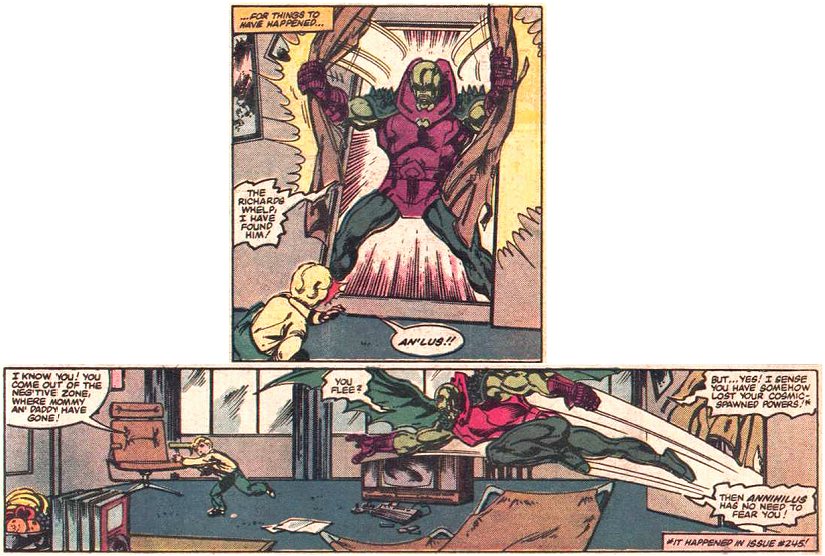

Not only did Reed leave Franklin undefended, but in FF245 he had made Franklin powerless. Annihilus has a special interest in Franklin (see FF140), he rules a large part of the Negative Zone, and his greatest desire is to reach our universe. So this attack was hardly unexpected. It could be argued that Franklin's worst enemy is Reed, and Sue is partly responsible because she always deferred to Reed instead of following her intuition. At the same time that Annihilus was attacking Franklin and Alicia, Reed was saying that nothing is what it appears. Is this really an innocent trip to the Negative Zone (if such a thing is possible), or is Reed's subconscious giving us a clue to the real nature of this "science trip"?
Reed as Hamlet
On a personal note, I have always been a huge fan of Reed
Richards. of all the team, I have only ever identified with Reed
(until recently). Reed is my avatar on the Fantastic Four Comic
books forum. I began my Reed
Richards page because I was annoyed that modern comics do
not portray Reed as such a hero.
But when making this web site I am looking for patterns and themes, and I am shocked by what I see: Reed Richards does not come off well at all.
Reed really is the Hamlet character. He is sincere, we care for
him and we see how he suffers, we see his heroic nobility. But as
the story develops we begin to wonder: did Hamlet really see the
ghost? Why did Hamlet not show remorse when he killed Polonius?
Was Hamlet faking being mad or was he really truly insane? Is Reed
like his father? Not evil, but not quite a hero either, despite
moments of great nobility? Only the reader can judge.
Other points to note

All the Negative Zone stories revolve around deep secrets that the people either cannot see or refuse to admit, because they cannot handle the truth. Is this a parallel to Reed's own mental state, e.g. the decision to enter the zone?
In FF254 Reed meets a race who have found their promised land but reject it. For Reed, Franklin is the promised land: Franklin is the future, Franklin has the power and secrets that Reed both wants and needs. But Reed won't enter that new, bigger world. Reed keeps Franklin at arms' length because Franklin has too much power, and Franklin has a greater claim on Sue's love. By putting Franklin first, Reed would no longer be number 1. Note that the head alien is called number 1.
Other points to note
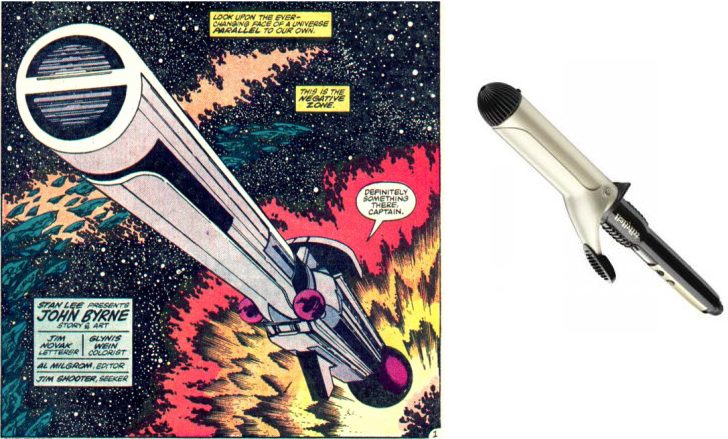



This issue is different from all others. It's the only time in the 321 issue series that we see Reed and Sue in bed (this is where they conceive the new baby). It's also the one that's dripping with evidence that Reed is consciously planning suicide.
Why is it not more obvious? In real life such plans are always
hidden. Nobody says "well friends, today I will kill myself." This
is especially true of a comic, where many readers are young,
others started reading recently and are unaware of the 20 year
back story, and still others buy the book for an entertaining good
guys versus bad guys story. This story works on all levels.
Other points to note

Alicia needs Ben to protect her, and he is never there. And his neglect leads to her being tortured, it almost killed her.Ben constantly puts off proposing, due to his self confidence issues. Being away having to save the world is understandable, but Ben did not need to go on this speculative adventure. And he knew that the Negative Zone entrance was unguarded because Reed told him so.This is when Alicia loses hope. The next time Ben chooses to stay away without a good reason, Alicia will find somebody else, somebody less afraid of commitment. (Next, Ben stays behind on Battleworld when the others come back.)
Meanwhile Reed gets his wish, almost: he almost dies (the cover says he is dead). But Reed will always fight: it's a matter of pride. A death wish is not a simple suicide: it is simply an attraction to deadly danger.
Other points to note
Note that Ben genuinely loves Alicia. His feelings for her are real. His neglect is due to his personal issues, his deep fear that she cannot really love him. But they need each other and it is only his tragic personal issues that force them apart. After this turning point, Ben will finally face his issues on Battleworld, and ironically Alicia will take that as final proof that he has abandoned her.
This issue we see yet more evidence for a death wish:
At best, Reed is irrational, at worst he not only wants to die
himself, but wants to take his family with him.
The end of Act 4: black
costumes for their darkest hour
With the discovery that Reed's actions have almost killed his son,
we enter the team's darkest hour. The final stages of Act 4, the act
where it all gets worse and worse. Soon Sue will lose their baby,
Reed will destroy their home, facilitate genocide, and more.
To symbolize the blackness their uniforms turn black. |


What is Reed thinking????
Franklin was never in danger by being in the Baxter Building, that was the only thing that gave him any protection since Reed left him powerless!
Franklin has only ever been in danger because his parents neglected him. Mainly through giving him to Agatha Harkness (Agatha delivered Franklin to Annihilus and later her son Nicholas Scratch possessed the child)
So what does Reed suggest? Take Franklin to an unprotected house, and then leave him while Reed goes to work each day. What a great idea. What could possibly go wrong?
The Reagan annuals: empires at war
Ronald Reagan was known for his military spending, including
his "Star Wars" program, and his "strong" attitude to America's enemies.
So all of Byrne's Reagan-era annuals are about empires at war:
Milk is always the symbol of what we eat and drink as a young child.
American children are raised to recite the pledge of allegiance every
day, to see gun ownership as a moral right, to see the nation as the
world's policeman, and so on. To other nations, this is disturbing. The
metaphor of Skrull milk is perfect.
Another way to see annual 17 is that
Reed (America) should have dealt more decisively with the Russians
(Skrulls). Instead, he literally kicked the problem "into the long
grass" and it didn't really go away. Similarly, annual 18 and 19 are
about the end of the cold war, about the rise of peace. So these annuals
can be seen both as a condemnation and vindication of Reagan. The Great
American Novel is not polemical, it is simply here to make us think.
Decisions have consequences
We have seen before that Reed's method (conflict) does not solve
anything. Here we see that this is true in the long term: even if
we think a problem is solved, then it comes back to bite us.
Sue's method, for comparison
What else was Reed supposed to do?as there any other way to stop
the Skrulls in FF2? Let's see what Sue would have done. In FF37 we
saw Sue's method against the Skrulls:
The splash page
Things are so bad that simply still being together is a reason to
celebrate. Note the irony: Johnny says that the only thing that
could be better is if Galactus joined Weight Watchers. Yet the
irony is that Galactus did
shrink and was about to
stop eating planets, but Reed saved him, and immediately when they
get back (at the end of FF257) Reed is put on trial for exactly
that.
The Great American Novel
This is an affectionate look at the American "flyover" states. We
see a small town, the roads, the fields, a dairy, a military base,
Just as FF4 was a guide to the city, this is a guide to the
country. Although the people become monsters they don't mean any
harm, they just want to be left alone. The theme of this annual,
that decisions have very long term effects, is a warning to every
politician, especially in a nation the size of the USA.
Other points to note

This issue provides a stark contrast with Reed from the previous
issue, FF257. Dr Doom cares more for his adopted son than Reed
does for his real son. "First and foremost" comes Kristoff.
Throughout the issue, Doom is shown seeking out the opinions of
others. True, he considers everybody as inferior to himself, and
he is ruthlessly violent if he disagrees, but he does care and he
does listen. Doom delegates. He trains others to replace him. Even
the most arrogant man in the universe understand this.


Doom's character development
For an overview of Doom's development in his twenty appearances see his own page.


This issue is entitled choices. It is subtitled a "bold new beginning" for the Fantastic Four.
Reed has finally decided to leave the Baxter Building.

Reed will face a choice: will he focus on Franklin, as the decision implies? Or will he keep running back to the Baxter Building whenever he can? What will be his priority?
Sue also faces a choice. Will she take control and make Reed do the right thing? This is the first issue when Sue really shows what she can do alone (against Doom). "This is the issue the Invisible Girl starts down the road toward being the Invisible Woman." (source)
Other points to note:


The splash page is a reminder of the famous photo from 1945, where a
sailor returning from war grabs a nurse and kisses her. This link is
reinforced by other elements in the story.



So 251-262 is one year of stories (our time) in around five days, our time! This is a crazy pace that cannot continue or something will break. Meanwhile John Byrne is running late for a deadline (see FF262), implying that his life takes place in real world time.
A problem with chronology?
In FF262 Sue says that FF244 (when Reed saved Galactus) was
"months ago": but this was a unique case of a comic book character
talking to a real world character about chronology. There are at
least three obvious explanations:

Did John Byrne remember this
correctly?
The Watcher said that the memory was already fading. By the time
the comic dialog was added we can expect it would contain errors.
Did Galactus need to be saved?
Galactus is a phenomenon, nothing has ever been able to stop him.
Whenever he appears to die he always comes back in some way. The
High Evolutionary even dissipated Galactus into an energy field,
and still he came back. It is absurd to think that Galactus could
have been ended forever simply because he grew tired!
Then what did Reed do?
Reed showed Galactus that Reed is his friend. That is why Galactus
defended him at the trial: to help "that mortal I name friend."
Incidentally, this ends Galactus as a threat. He is now Reed's
friend. While it is conceivable that Galactus may need to attack
Earth in the future he does not want to, and will take any other
alternative if possible. Somebody with Reed's mind can always find
some other solution. The
Galactus-versus-Earth subplot is over.
Was Reed to correct to try and
save Galactus?
Reed was "steadying the ark." See Biblical book of judges: the Ark
of the Covenant was a symbol of God (kind of like Galactus). It
was carried in front of the people of Israel. At one point the
cart stumbled and a nearby priest put out his hand to steady the
ark. He was struck dead by God. Why? The idea that God needs help is far more
dangerous than the idea that God might appear to fail to our limited understanding. But
Galactus is not God, he does not require worship, so he found
Reed's efforts to be merely a sign of friendship.
Reed Richards
Reed's logic is faulty: he says that Galactus is not good
or evil, therefore he
is not evil, therefore
he is good. If we ever wanted proof that Reed has mentally fallen
apart y the end of Act 4, then here it is. As to why the Watcher
agrees, we will come to this in a moment.
Odin
Odin says that Reed was not criminal, because Galactus is a test,
just a s the dangerous seas made the Vikings strong. .But listen
to who is speaking! The Norse gods were a pessimistic lot, where
all of life was a cold, harsh, negative thing, where death in
battle was the best you could hope for, and even the gods would
eventually die. Odin is simply a pessimist who believes that death
and annihilation is good. We may have well heard testimony from
Chthulu. Let us move on.
Galactus
Galactus said that Reed is his friend, with pure intentions and
[therefore] his deed was honorable and good. Yet Galactus is above
good and evil (as stated in his first appearance and repeated in
this issue), so why did he use the word "good"? His only concern
is his own needs, and he speaks simply because Reed is his friend.

 What is cosmic truth?
What is cosmic truth?
Why, then, does the Watcher say that Galactus is "the cosmic
truth"? Note that the Watcher hangs his head when he says that.
We'll come to that in a moment. The best guide we have to cosmic
truth is the final story in FF annual 23: the story surveys all
levels of reality, and comes to the final conclusion that scale is
an illusion and the highest plane of existence is whichever one
you currently occupy. So the
cosmic truth is that the cosmic truth is nothing special:
if 2 + 2 = 4 then that is true wherever you find it. It is
dangerous to believe in a higher truth takes precedence. Is there
a place where 2 + 2 = something else? (See George Orwell's 1984:
freedom is the freedom to say that 2+2=4 regardless of what the
controlling party may say.)
Galactus as cosmic bacteria
Galactus cannot choose either good or evil (see the last page of
the story, where the Watcher again hangs his head). Galactus is
simply a test that keeps populations healthy. Ironically, in this
story an attack on Galactus is compared to bacteria on a human
skin. Yet the moral analogy is that Galactus is the bacteria: his
attacks are necessary to maintain a good immune system. Yet a
moral person will act to prevent bacteria from wiping out whole
populations. Reed did the opposite. He decided that bacteria are
good (true) therefore they should not be opposed (false).
For more about the nature of Galactus as cosmic tester, see the discussion by FF74.
Lilandra
Lilandra understands morality. Unlike the passive Watcher and
destructive Galactus, Lilandra says she is pledged to preserve all
life. She is scared by Galactus (rightly so), but is also
not impressed by his amorality.
Sexism
equality and sexism are a major part of America and this is the
Great American Novel. So Lilandra plays the role of females
throughout the Fantastic Four: beautiful but out of her depth,
instructed by the men. All the
witnesses are male (there may be doubt over Eternity, so
Galactus calls him "father" just so we know. Where are the mothers
of the dead Skrulls? Like in some ancient court, only the men's
testimonies are heard. The only female who looks like she might be
a witness (Frankie Raye) is actually a herald for the man,
Galactus. Yet Lilandra is
correct and all the men are wrong! She is the only one
who is devoted to saving lives! The woman speaks the truth despite
the male sophistry (Reed), amorality (Galactus) and love of war
(Odin)! She is only finally persuaded due to mind control. And
what of Sue? By the end of Act 4 (most recently the torture of
Alicia and Franklin), Sue is so emotionally beaten that her only
role is to be as cheerleader for her husband
Eternity
Eternity does not say Reed was right. He simply says that Galactus
should exist. Alarm bells should be ringing at his strange choice
of words: Eternity says that "mortal life hangs in the balance,
because your truth is doubted." Excuse me? Mortal lives hang in
the balance all the time:
that is why it is called mortal
life. People die all the time because of false understanding, so
why defend Reed? Look forward to FF351: on a cosmic scale, Reed
Richards matters. (Because Earth matters, and Earth matters to
other planets because of the superheroes. Reed is the one who
triggered the superhero flood gates opening, and his team is at
the cutting edge of everything that happens, and he puts himself
right at the front.) The message of Eternity is not that Reed is
right, but that Reed should be saved.
Lilandra again
Finally Lilandra and the others were brainwashed into accepting
Reed's innocence.
The Watcher
The Watcher summarizes the trial by saying that the correctness of
Reed's decision will never be
questioned (except by fan boys like me, LOL). That is not
the same as saying that Reed is innocent or that killing billions
of people is suddenly OK.
The zeitgeist: religion
These recent issues were written in the early 1980s, when American
politics, after moving toward secularism in the 1960s and 1970s,
turned back toward religion. This was due to the famous wedge
issues of evolution and abortion that gave the Bible Belt to the
Republicans, and the rise of the tele-evangelist and other trends.
Many (arguably all) of these issues of the Fantastic Four have
underlying religious themes:


This issue is about a false messiah: a man who, like Reed, thinks
he is doing the best thing possible, saving the world. But in fact
he's making it worse.
Sue looks to be in love?
When a woman is neglected by her husband she will often do her best to
be loving. Here we see Sue doing her best to act like all is well. Yet
still Reed abandons her when she needs him.
How much time passes
Most of the second half of act 4 passes extremely quickly, with
just a day or so per issue. But two months pass here. Reed can no
longer complain that he is to busy for Franklin. He had two months
without any major danger.
Reed's willful neglect
Franklin wants to talk and play, but instead Reed leaves, to go
and potter around in the Baxter Building. Reed would rather spend
his time on anything other than Franklin, his own son.
Reed's face
Without dangers, Reed loses his sense of purpose. Notice how his
"living in a small house" face is even more haggard than his
regular face, reflecting his
inner state.
The Great American Novel
What could be more American than Disney? This issue is the FF's
homage to the brand, though of course it cannot use the actual
characters. Note that Maas (any relation to "Mouse" may be
coincidental?) is not a villain, he simply did what he thought was
best - the entire issue is sympathetic. It's the robots who go too
far. Disney world is of course famous for its animatronics and
underground tunnels for staff.
The Mole Man in context
For how the Mole Man's ten appearances reflect racism and the underground in America, see the notes to issue 1.

The expanding Earth
"Alden Maas" is an anagram of "Neal Adams," the artist famous for
his influence on comic art, on creators rights, and his belief
that the earth is expanding.


The above image from Wikipedia shows an extreme version of the
theory: actual expansion if it happens may be far less. The theory
doesn't sound as crazy if you put it another way: the Earth's core
is becoming less dense. This comic was dated February 1984. In
November 1984 a reputable science magazine published an article
summarizing the evidence for expansion. In short, continental
drift fits better if the Earth is expanding. If you try to fit the
continents on a modern sized planet there are gaps, and these gaps
reflect newer crust.
"The geological and geophysical implications of such Earth expansion are so profound that most geologists and geophysicists shy away from them. In order to fit with the reconstruction that seems to be required, the volume of the Earth was only 51 per cent of its present value, and the surface area 64 per cent of that of the present day, 200 million years ago. Established theory says that the Earth's interior is stable, an inner core of nickel iron surrounded by an outer layer that behaves like a fluid. Perhaps we are completely wrong and the inner core is in some state nobody has yet imagined, a state that is undergoing a transition from a high-density state to a lower density state, and pushing out the crust, the skin of the Earth, as it expands." (Owen, Hugh; "The Earth Is Expanding and We Don't Know Why, "New Scientist, p. 27, November 22, 1984)
While Owen's view is of modest expansion, more extreme theories
seem to contradict the evidence: they suggest that all continental drift is
driven by expansion, and that the earth was much smaller. However
there is evidence for other causes of continental drift, and a
much smaller earth would have noticeably higher gravity on the
surface which would show up in dinosaurs finding it harder t grow
to such sizes. This is reflected in the comic: while in a world of
comics an expanding earth is perfectly reasonable, the man
supporting it goes much too far.
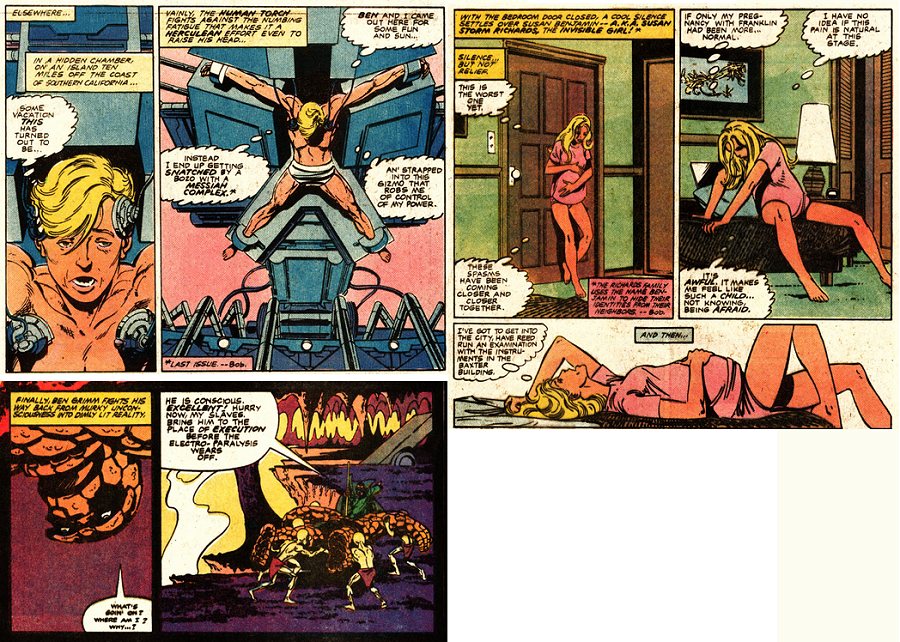
To see the importance of this issue, step back and see the big 27 year story. Reed's story is his need to put his family first. Eventually he must step down as leader. This issue reminds us of his lack of social skills. In this issue we see that everyone is separate and alone, exhausted or paralysed. Reed is not on top of the situation. In particular he's abandoning his pregnant wife. Reed believes that he cannot make time for Franklin because he (Reed) is needed to lead the team, but that is not true. He's not a good leader. His story is of his need to become a good father instead.

Meanwhile, Ben is crippled by self doubt, even now. Ben's story is to
come to love himself as he is: he will finally find his natural place
at the top.


Note the pose when they leave for Secret Wars. it is the same pose as used on the back of oversized Fantastic Four Treasury Edition, intended to show the FF at their most noble.


Other points to note

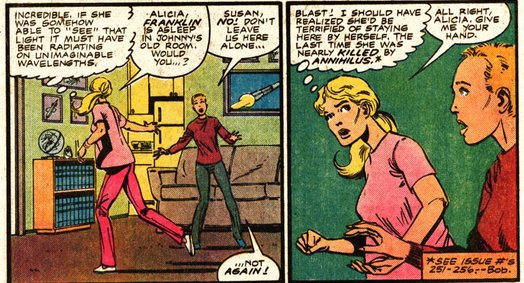
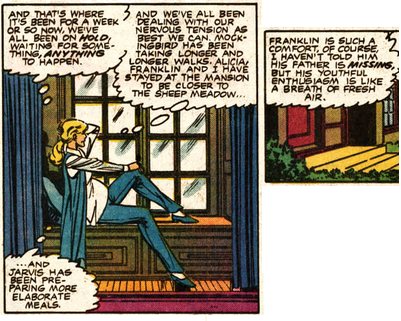
This issue is about Reed's refusal to be a real man. In the past
he was a chauvinist, and his family came crashing down round him.
now he has lost confidence, but instead of treating Sue as an
equal he goes to the opposite extreme: he spends his time on the
house, and chooses She-Hulk, a woman who is stronger then him, one
who towers over him. Reed still cannot see women as equals.
"The house that Reed built"
What has Reed been doing with all this free time? Spending time on
his son as promised? Making Sue feel special? No, working in his
shed. He made high tech devices to protect his family, when the
only power than can really protect his family is his son, if only
he cared enough to notice.
And now, as the high profile leader, he's been called away on business. He spends time on the house and on his job, but not on his family.
How essential is it to fix up the Baxter Building? Reed and Sue
and Johnny all live elsewhere now, and Ben can look after himself.
What is Reed really doing there? Only fixing the security? Or is
he making plans for something? See notes by FF279.
A family drama
Note that superpowers are just a McGuffin, an excuse to tell a
particular story. This story is really a familiar tale of a father
not having time for his family. The super powers just make it more
colorful.
Peter's final issue
This is the end for Peter Petruski's story of coming unglued. he has failed at everything.

This is his last attempt to do something, on his own because nobody has
any respect for him. He needs to prove himself but can only defeat
himself.

This is a flashback issue, so we can see the contrast with what happens next.
This issue forms the calm before the storm, so we can appreciate
how far the family has fallen in a short time since the optimism
of FF232, and how much worse it's about to become.
The importance of being cosmetically aware
This was a light hearted story that Sue and Ben told to Alicia
later, so it would be perfect to tell to Franklin as well.
It would reinforce the simplistic view that Franklin has of
romance: that men should automatically love women. Note the (pun) punchline:
Karisma was "cosmetically aware": even she understood these basic
superficial rules.
Contrast that with Reed's neglect of Sue: he looks so deep that he
can't see the obvious surface things - a man should pay attention to
his wife. So the stage is set for what happens the next issue.
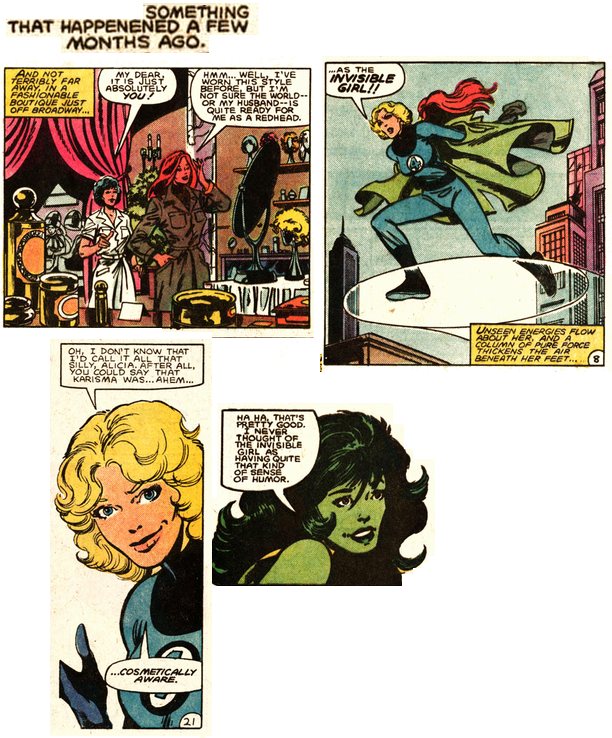
This story reminds us that things are getting worse and worse.
This story is set at the around the time of FF232, when Sue was
trying to be happy and pretty for Reed, to make everything right.
They tried to act happy, to joke around, to act like everything is
right. But now we can see the contrast: instead everything went
wrong, and it's about to get far worse.
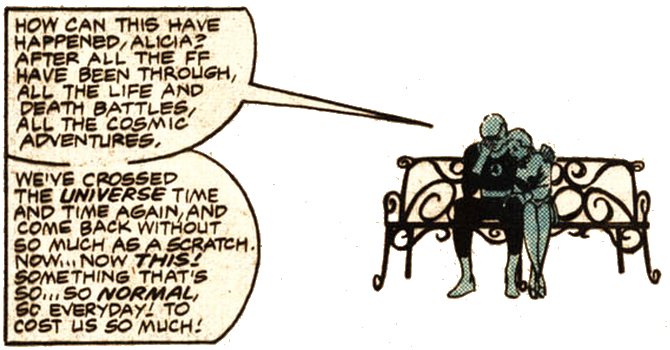
Why does Sue lose the baby? Because Reed exposed Sue to radiation
in the negative zone.
Years later it was revealed that the baby did not die. Her
consciousness left her tiny body, but it went elsewhere to a different
body far away. Most fans consider this a horrible retcon that cheapens a
powerful story. But seen another way, it heightens the tragedy.
This is why.
The long term story structure
The story of the baby (later named Valeria) is an example of how the
Great American Novel has a large scale structure, where every issue
matters. Even though it was not planned that way, and the connections
may not be obvious at the time.
The baby was to be their second child. To see what happened, consider
the first child's point of view. Sub-space plays a key role. so we need
to go right back to act 3:
Franklin and sub-space
You can see where Franklin's mind is
leading. At this point Franklin is aged 15 in Real Time, but emotionally
he is younger. He has been neglected and put in danger by his father
for his whole life. He is scared. And now he is about to be replaced. A
sweet baby girl will now take his
parents' affection. And now the final straw: the pregnancy is causing
his mother great pain! What if it kills her?? A scared 15 year old with
stunted emotional growth
will come to an obvious conclusion.
What would Franklin do?
So Franklin sees the baby as a threat (unconsciously at least). But he also knows that his mother loves the baby, so he can
hardly kill it. Let us see what he as done when faced with crises in the
past:
So Franklin can fix things, but how?
OK so Franklin could unconsciously remove the baby to another body, but where?
So by FF267, the loss of the baby, we know that
So the story of saving of the child was contained within the
early stories, even though it was not made explicit until later. Even Lockjaw is there, as Valeria's "Puppy".
For the other way that Franklin tried to fix things (with Johnny and Alicia) see the notes to FF 269.
Heightened tragedy
Does this weaken the story? Not in a Shakespearian sense: in the classic sense, the tragedy is heightened by Franklin's unconscious act.
If bad things are just bad luck that is
unfortunate but not tragic. Tragedy implies bad things due to a personal
failing in an otherwise strong person. And for the greatest
tragedies, the suffering must be truly pointless, and only due to our
lack of understanding. Take Romeo and Juliet for example. Romeo kills
himself because he thinks Juliet is dead, and that is sad. But it is a
greater tragedy
because Juliet is not dead.
Then Juliet kills herself because she thinks
she can never he happy, which is of course sad. But it is a greater
tragedy because it is so unnecessary: lost love should not cause such
grief: she is a
fourteen year old girl who had a four day romance (Shakespeare's version
covers Sunday through to Thursday morning)! The real villain was the
dysfunctional family. That is the tragedy, not the death.
This Shakespearian motif is repeated in the loss of the baby. It was
caused by Reed's choice to conceive in the Negative Zone and then ignore
Sue as her pain increased. It was a tragedy because it could have been
avoided if only he paid attention to his existing child. This
unnecessary suffering was foreshadowed in the half way story, in
FF155-157: the Surfer's tragedy was that he has lost his beloved Shalla
Bal. But the tragedy was worse because; unknown to him, she was
transported to a place where he could
see her again is only he knew:
just as Valeria was transported somewhere safe. But Sue, like the
surfer, was miserable
because she did not know. Then later when she met Valeria again she
thought the child was an impostor, just as the surfer thought the girl
he saw as just a look-alike. Both innocents were put through the
emotional wringer precisely because their happiness was so close yet
they did not know where to find it.
Without Valeria...
Without Valeria the miscarriage would destroy the whole story. Byrne
intended it to give "the illusion of change" without actually changing
anything. But if nothing changes, there is no big story. Valeria gives
the miscarriage long term significance: it is not simply an event
without consequences that can therefore be forgotten. It does not simply
fade into the past, or no relevance to new readers. Its importance
grows with the years. Let us look at why:
Valeria (or Maleria as many fans call her) is possibly the most hated
character in FF history. Why does she exist, other than to ruin
stories? What does she add to the FF? When we find the answer then everything else falls into place.
Valeria is essential to the bigger story moving forwards. This is why:
Valeria's life and career
Valeria was an unborn child in FF277. Franklin sent
her
to a place of ultimate safety: to Roma, "omniversal guardian" who is
charged with the safety of all dimensions. How would that work?
FF322-326 (the end of long term continuity) shows us. In FF322-326, two
dimensions (magic and normal) merge. From this point on
the Fantastic Four routinely hop between dimensions, and sometimes get
younger. Valeria is the clearest example of this, because as the
youngest (and a girl) her bodily changes are the easiest to judge. Let us
follow her life across the dimensions:
As for how this plays out in the future, only time will tell. I just
wish they would all age normally: life would be much simpler.

Reed admits that it was his fault, but cannot see the implications: maybe he should pay more attention to his family and less to his hobbies?
The mask of Doom
Since FF232 Reed has worn a mask. Before that, he would react passionately to his failures. See his outbursts and his sulks when Sue left. See how he gave up when he lost his powers. See his admission of despair when trapped in the negative Zone in FF231. He doesn't do that any more. No, no matter what happens, he shows the same near-emotionless face. Metaphorically Reed wears a mask, hiding the crisis underneath. And like the literal; mask of Doom in this issue he races around metaphorically shooting fire from his eyes, causing disaster after disaster. And like the mask he can only survive as long as he receives power from outside. He relies on his family and is not the self contained power he believes. Eventually, in the last issue of act 4 (FF295), he will see that.
On planning ahead
The previous issue, FF267, saw Reed at his emotional best. His emotional dialog, when dealing with Otto Octavius, has never been better, before or since. He was dealing with a man who was emotionally even weaker than himself. Reed thought he could perform a last minute rescue, and acted as a great hero, with all the confidence of old. But true success cannot rely on last minute heroism. Reed's lack of dedication in preceding months and years led to that disaster. As a literary contrast, this issue shows Reed's mirror, Doom, and how Doom always plans ahead. Doom never leaves anything to the last minute.

Since FF232, Sue has tried to be the perfect Stepford wife, making life easy and very sexy for Reed, pretending that all is good. That all ends here. No more Stepford Sue.
As the above images show, Sue reacts to frustration the same way that Franklin does: she pushes things away. The next issue, FF270, follows just seconds after Sue's violence: it shows the greatest bonding we have ever seen between Sue and Franklin.

Franklin pushed Frankie away
This is what Franklin did in FF242. He could see that Frankie did not
really care for Johnny she only cared for power. So Franklin brought
his herald Galactus, somebody Frankie could not resist. That pushed her
away, leaving Johnny free (in Franklin's mind) to find somebody better.

Franklin pushed Ben away
Franklin then did the same in FF245. At first he thought that Ben
wanted to be human, but the he realized that Ben was scared of being
vulnerable. So Franklin gave him a thick skin back. This meant nothing
would ever change with Alicia: as long as the thick skin survives, Ben
will never face his problems. Franklin didn't push him a long way from
Alicia, just a few inches, but far enough that Ben felt safe.

But Franklin knew Alicia well. Alicia was his sitter: Franklin spent more time with Alicia than anybody else. he understood her emotional need for commitment: a child understands that perfectly.
Franklin did not "make" Alicia and Johnny fall in love.
To Franklin's immature mind it was all very simple. Johnny needed
somebody reliable. Alicia needed somebody who could commit. Be needed a
barrier to feel safe. By giving them what they wanted everything would
naturally come right. Franklin did not mess with their minds, he simply
removed barriers. Here is what happened n Franklin's own words, from
FF322:

Johnny sums it up as "he made us fall in love" but that is not what Franklin said. This is how Johnny interprets what Franklin said. What Franklin said was:
Note that he had the idea at that moment, but Alicia did not date
Johnny until almost a year later their time: Sue's pregnancy and many
other events came in between. Throughout that time Alicia went with Ben,
not Johnny. So the mind control theory fails: Franklin must have meant
"At that moment I understood how Ben felt, and so later I made Alicia
spend time with Johnny."
Johnny's dream
Then why did Johnny interpret Franklin's words as mind control?
Simple: because this was Johnny's dream - a dream about getting back
with Crystal.

In the dream, Crystal came back and Johnny needed an excuse to leave
Alicia. True, the dream represented what would have happened if the big
story had not ended in FF322-326, but it is filtered by the person
dreaming it. For example, in Ben's dream (FF329), Sharon is disappointed
in him, whereas in Sharon's dream Ben no longer wants to be the Thing.
Both dreams contradict what was previously established, but both reflect
the insecurities of the dreamers. The dreams are distorted versions of
what would happen in real life, just as in all dreams.
The end of the dream
At the end of the dream Franklin says he makes everything right
again. But at that time Johnny already wanted Crystal and Ben was
already falling out with Sharon (in Ben and Sharon's dreams). His
magical "make it back to normal" needed no power at all: he simply gave
Ben and Johnny an excuse to do what they wanted to do anyway.
Why Alicia went with Johnny
How did Franklin "make Auntie Alicia go to Uncle Johnny"? The comics show what happened:


Where can Alicia go? Ben is not there. So she begins to find excuses to be with Johnny.
In FF269 we learn that Sue's doctor is called Dr Lansing:

This comes is only two issues after Reed looked found all the relevant medical specialists in the Marvel Universe. It cannot be coincidence then when John Byrne began with Marvel comics he drew the Champions (issues 11-15), and would have read the previous few issues, including those featuring Dr Lansing, who specialized in enhanced humans and extended life.
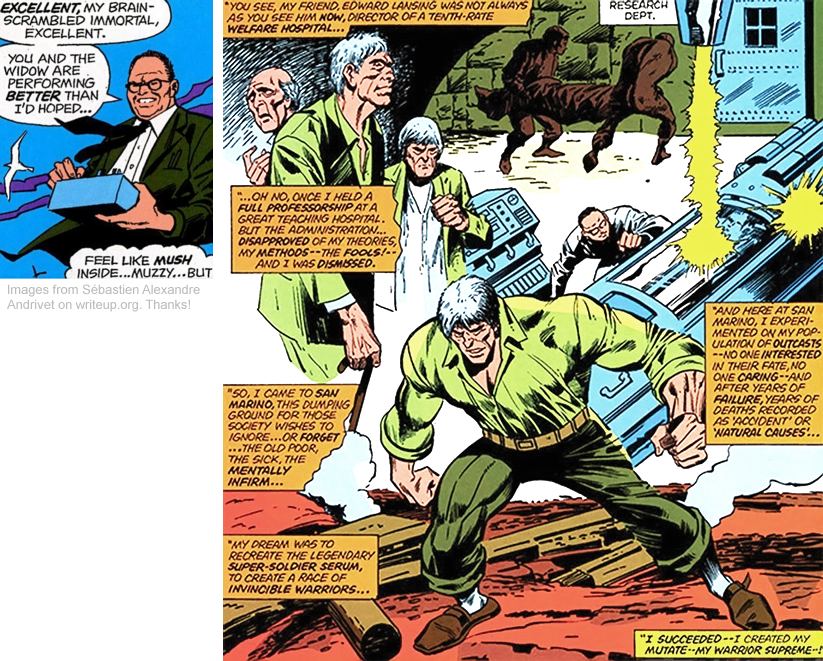 I
I
Reed said (probably rightly) that the miscarriage was due to
conceiving the child in the Negative Zone. Lansing said no., How could he
be sure, when he knew far less about the Negatve Zone than Reed?
Because there is one very obvious fact about Sue's fertility, that any
moderately trained doctor would immediately pick up: although Sue has the
body of a woman in her 30s, her eggs
were probably from a 50 year old. Sue was de-aged in FF 214, but for her
true age see the notes to FF292. Lansing's obvious
conclusion, not knowing her real age, is that this was cell damage due
to the early radiation. But knowing that she is too old, but not wanting
to face it, would add to Sue's tragedy.
The nature of Franklin's powers
Finally Sue carried the baby to full term, but this was a different Sue. This illustrates how Franklin's power
works: rather than having the magical ability to change anything he
simply shunts us into a different dimension where what we want is true.
He is like Lockjaw, a dimensional traveler; like the philosopher Crates, "the door opener". This confirms the explanation of cosmic powers
in the back up stories to annuals 22 and 23: scale is an illusion. The
more powerful beings are not actually more powerful, just different.
There is something very odd about the Terminus story. A number of things
don't quite add up. There is nothing serious enough to say "that
cannot have happened" but it is odd enough to suggest an alternative
hypothesis:
It all pushes the FF's normal realism to almost breaking point. But the
last point, Reed's happiness, fits a number of coincidences:
Remember that Reed reports his stories to Marvel, who publish them. The simplest explanation for all this is that Terminus was real, but much less of a threat, and Reed described the battle in such a way that it restored his reputation. As if he told Marvel "I failed in one way, but look I now succeeded in a much bigger way." The next story after 269-70 continues the aftermath of Reed's failure to ave his child: with a look to his own parents and the question "who is Reed Richards?"

This is the issue where Alicia accepts that she can no longer depend on Ben to protect her. So she makes a choice that will finally drive Ben to face his problems, and Ben's additional stress will at last force Reed to question himself, leading to the solution to the crisis of act four. It all starts here.
Alicia: the most powerful human of all.
Here we see Alicia to to the FF what she did to Galactus: she changed history by reaching inside a key person's soul.
One of the major themes of the FF is family: that is, soft power, how relationships are stronger than brute force. We see this in how Sue has always been the strongest character and made things happen. But Alicia, even more gentle than Sue, and in the most important events (Galactus in the 1960s, and the final climax to the 28 year story) she is even more powerful.
In FF49 Alicia defeated Galactus by inspiring the Surfer, thus breaking Galactus' will. Why else did he give up so easily? The Ultimate Nullifier just gave him an excuse: somebody with his power could easily have stopped time, encased Reed's hand in ice, or whatever. Galactus' will is the all. Weakening that will was what defeated him. The surfer was his only friend. Galactus and the surfer were analogs of the traditional avenging Old Testament God and the messiah figure. What he surfer did mattered. it touched Galactus at the heart. And it was all due to Alicia: Alicia to the FF is like Mary to Catholics. The silent power behind the throne.
Here Alicia does something just as significant. By touching Johnny's heart she changes Ben. By changing Ben she changed Reed, and solves the unsolvable crisis (see FF295, the final issue to act 5, where Ben's distress finally breaks down Reed's barriers).
Is Alicia really leaving Ben?
Here is how Alicia describes this momentous event:

Alicia says Johnny has put his finger on the problem. People
think Alicia and Ben are married, "But we are not. Not in any
sense of the word. We were two people drawn to each other by
mutual needs, mutual dependencies... and somehow we've each turned
a corner in our lives. Things between us are.. different. Ben and
I still love each other. We always will. But somehow I think we've
both come to the realization that..." and she will say no more.
Two levels of meaning
Alicia's words can be read on at least two levels. On a short
term level readers can say they never deeply loved each other, and
move on. There is no need to think of longer term continuity.
After all, mutual needs are not a good basis for a relationship,
right?
But when we look at the longer term we see something different: Alicia and Ben are meant for each other, and this time out is the only way for them to make the final step to marriage.
Alicia and Ben: destined to be together
What Alicia calls "mutual needs" are the perfect foundation for a relationship: they
mean the couple will always be together. Alicia and Ben are also
very similar types: both has a barrier between them and others
(Ben's appearance, Alicia's blindness and sheltered childhood).
Both tends to not share their feelings. Both had a very tough
childhood. And they both enjoy each other's company. But their problem is that neither of them took charge.
Either of them could have said "it is time to marry, we must do
it" and the other would have been talked round.
But they both come from controlling, confidence destroying
backgrounds (Alicia's childhood, Ben under Reed), and they both feel
very vulnerable (Ben fears he will never be loved, Alicia is blind and
vulnerable to the FF's many enemies: she needs Ben). So both were afraid
to push. Ironically they each have infinite courage in the face of
danger
but not the courage to tell the loved one what needs to be said.
Not only do Alicia and Ben have mutual needs, they have so much in
common and think the same. They were the perfect couple!
In this context, Alicia's words mean they should be
married. Because they will always love each other. She says they
have both come to a realization. She does not say what it is
directly, but we know what it is from Ben: they need time apart.
Ben has his time apart on "Battle World". Alicia has that time
apart with Johnny.
This does not mean they are separating, they are simply taking
time away to think. Alicia does not consider marrying Johnny until
FF297, after Ben has (in his emotional pain) rejected her again and she
gives up hope.
The zeitgeist
The tragedy of marrying the wrong person reflects the changing
morals in the 1980s. In previous centuries marrying the wrong
person was the end of the story: divorce was impossible. Even in
the 1970s divorce was still largely frowned on by the majority of
people, most of whom were raised in the 1950s or before. But in
the 1980s the world was changing. Most people were raised in the
1960s or later (i.e. born in the mid 50s or later). What was
previously a radical approach was becoming mainstream. Most people
began to accept the idea that marrying the wrong person,
correcting the mistake, and still loving both people is possible,
at last as an ideal. And given that Alicia was solving everyone's
problems it was never in doubt that they would all love each other
afterwards.
Criticisms
of this event
Is it creepy that Johnny likes somebody who looks just like his
sister?
She looked like Sue in 1962 (eleven years earlier, their time),
but probably not quite as much now. Besides, a recurring motif in
the book is doppelgangers: they have seen so many people who look
exactly like themselves that this would not be a big deal any
more.
Is Alicia using Johnny badly?
Taking the "time apart" view, is Alicia treating Johnny badly by
agreeing to marry him when her heart is with Ben? No. She works by
intuition, not conscious plans. She does not consciously plan to
return to Ben. She is sincere. She will let what happens happen:
that is her way.
Intuitively she knows this is the best thing for Johnny as well.
This leads to Johnny learning how to relate to women and this
solves his problems. It also, by solving Ben's problems, leads to
the return of Crystal and so eventually
everyone will be with their soul mate. (Clearly Alicia and
Johnny are not soul mates: compare Johnny with Alicia to Johnny
with Crystal, or Alicia with Ben. Johnny's occasional "this is
right, I am in love" outbursts only seem designed to persuade
himself.)
Perhaps Alicia thought Ben would hear the news and come back, or
her father step in and end it - perhaps she could never imagine
the marriage would actually happen. But she was following instinct
all the time, so when it happened she let it. In doing so she also
healed her father (see FF300), so this was win-win all round.
This is also a classic tragedy: the heroine marries the wrong
man. This is, after all, the Great American Novel, and what is a
great novel without great tragedy?
But Johnny was a womanizer?
After 14 years as the most eligible celebrity in the world,
Johnny only had four girlfriends: Dorrie, Crystal, Frankie and
Lorrie.

Every one of them dumped him. Frankie, twice.
Did this all happen too quickly?
It wasn't too quick for Johnny: his failure with girls goes right
back to the beginning. His frustration goes back almost as far. As
a 28 year old
heterosexual male he would be desperate, below the surface. He has
admired Alicia for at least three years, his time, as we saw in
FF160:


As for Alicia's own change of heart, it was gentle, not rushed. Ben's dithering goes back to the
start of act four or before. As a sensitive person Alicia would
notice this. Her concerns for Ben's emotional problems became
particularly prominent in Moench's run. She has now had five
months in hospital to think about how Ben left her, and then hears
he has abandoned her again. She would also be aware of Johnny's
qualities and his frustration.
Finally, this is the tenth anniversary of dating Ben: Alicia is now 29 year old,
biologically the same age as Sue (since Sue de-aged by three years
in FF214). Sue just lost her baby. That, and facing turning 30
after ten years with a boyfriend who cannot commit, Alicia's
biological clock is starting to tick.
Is it fair for Johnny to do this to Ben?
Johnny was badly hurt when Crystal left him. Why would he now do
the same thing to Ben?
Well, Ben doesn't need Johnny's sympathy. Ben neglected Alicia far
more than Johnny neglected Crystal. And Ben is an adult, with more
life experience than the emotionally sheltered Johnny. Ben at this
point has had plenty of second chances with Alicia. He should have
proposed in the 120s when he began to come out of his depression.
He definitely should have proposed in the 160s when he planned to
do so but always put it off. In FF136 he had a push, and again he
could not do it. And now, after abandoning Alicia in 151 and then
again after Secret Wars, Ben has used up any good will.
For Johnny to continuing to support Ben while leaving Alicia to
be neglected and attacked again would be a far bigger crime.
Plus Ben was planning to separate anyway, until Alicia's decision
snapped him into soul searching (for him to reject her was
business as usual, for her to reject him hurt)
Is this theory contradicted by Ben's actions?
If Alicia and Ben are destined to be together, how does this
square with Ben's decision to break up, in FF277?
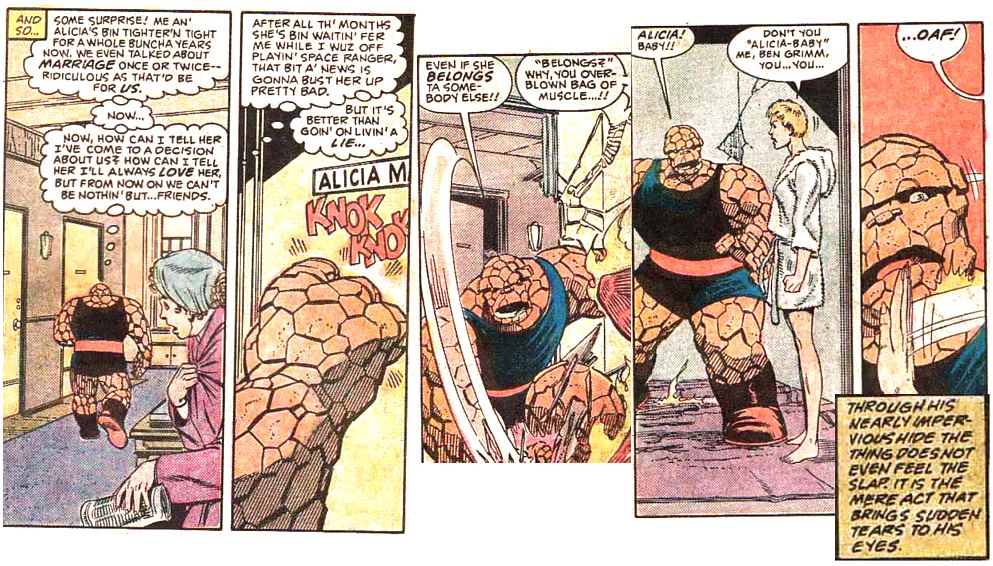
Ben later said that this slap hurt him more than anything he had
ever felt (even though he did not even feel it physically). And it
was clear after this that he still loved her, as we saw in FF303:

Clearly Ben was trying to do what he thought was right, because he knew he would never have the courage to propose, because of his inner doubts. But the slap began the process of him facing his demons, which resulted in Ben finally lacking the emotional strength he lacked.
As for Ben's belief that marriage would be "ridiculous", this is explained by FF236: he fears he might hurt her.

This is a major, defining issue for Ben, and why he unconsciously holds back his strength.
Some fans wonder if it's because of sexual problems (again, his fear of hurting her), but there are many kinds of sex. Besides, as any long married couple knows, marriage is more than sex. If sex was important they would not have stayed together, kissing frequently, for ten years: they would have either married or separated long ago.
Ben was planning to dump Alicia? Really?
Ben is a deep, tragic character at this point. Things are not as they
seem. A this point ben is on Battleworld, a planet that reflects hi
psychology. He's trying to make sense of his life. As part of this he
thinks he finds someone to replace Alicia, but of course she dies. Nobody can replace Alicia.
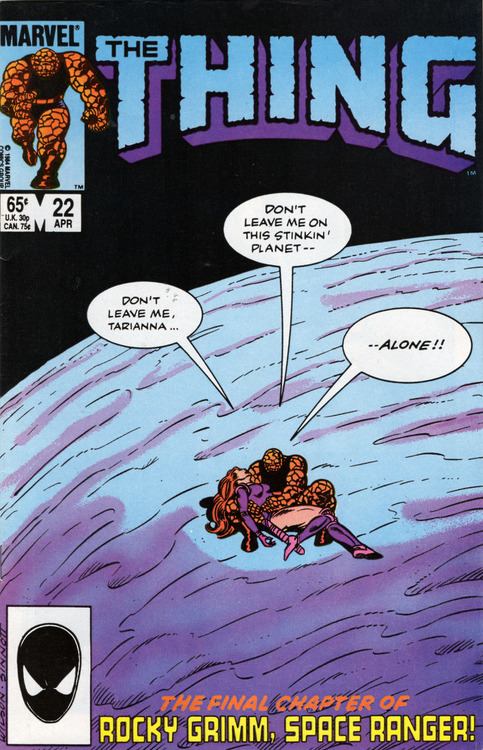



Was Johnny's upbringing really so difficult?
Johnny's need for Alicia depends on his own emotionally fragile
state. This can be easily be demonstrated by how easily Sue
controls him in Strange Tales, when she is still his legal
guardian, with how badly he fares on dates - showing off in an
immature way, and with his loyalty despite his frustration over
the years: he stayed at high school against his wishes, he stayed
in the team despite wanting to leave many times... all he has ever
known is being under the control of his sister.


Johnny at this point was 22 years old. He has never been free to
be himself.
But Johnny was shallow?
Johnny has such potential. Such depth that's been ignored for so
long most fans forget it's even there. Let's see him as Alicia
sees him. When Alicia joined the family (FF 8) Johnny was about to
begin his Strange Tales career. Yes he was young, but he was
incredibly creative, always coming up with new ways to solve
problems, and fighting above his weight. And he was a hard worker:
practicing for hours each day, flying through intricate mazes,
studying weather patterns, finding new uses for his flame. The guy
was amazing. Remember the colored flame model made in FF 17? Or
how he used his flame to create a tornado that could lift probably
thousands of tons at the end of issue 4? That's all down to hard
work and dedication. Beyond that he is intensely loyal. Over the
years he's been treated as a child, living in the shadow of the
others, and had every reason to leave. But he cares for his
family. He even gave up his soul mate, Crystal, because he would
not leave the family, despite them not appreciating him in the
slightest. He has a superb mind, incredible dedication and a pure
heart.
Summary
In summary, Alicia is destined to be with Ben, and Johnny is destined to be with Crystal.
but in order to get there, they have to solve their problems...
together.
For more on this topic, see the notes to FF275.
Issue 270 set in motion the events that will take place after the 27 story ends. As the big story approaches its climax we begin to fill in the gaps. We finally see what happened before issue 1.

Reed begins to pay the price
The negative zone adventure was Reed's death wish. In a way he got
what he wished for: his mind was removed from his body,
and some parts of it were lost forever. Now that he has
failed Sue (radiation from the negative zone killed the baby) his
death wish comes back to haunt him. Reed has always neglected his
family, and now, as karma, he cannot remember his own family, or
at least not the details.
Reed and Autism
Why the interest in his mother's eyes? Is that something most
people think about? Reed also says he
can't remember his mother's eyes. Avoiding eye contact is a
classic sign of autism. As an adult he would learn to look at everyone's eyes, but
it is likely that as a child his mother's eyes are the only ones
he ever looked at. For more evidence of Reed's probably Autism see the notes to FF182.
Why FF1 happened
This issue, the story of Gormuu, finally reveals the gaps in why
the spaceflight in FF1 happened:
Though Sue was motivated by pressing political concerns, to beat the communists, but if that was the only priority, why not trust the government's approach? They wanted to fund the space program more slowly, and divert more money to defense: if communists were really about to take over the world that was surely wise? But Reed's experience with Gormuu taught him that the communists were not the only threat, and space travel had to be a higher priority, just in case.
Gormuu's abandoned ship provided the essential insights that let Reed get his own space craft design working.
Gormuu's body was able to absorb energy without it causing harm, so his ship would not worry about shielding from cosmic rays. Perhaps this is why Reed was less concerned about shielding, having seen Gormuu's ship with its thin hull.
According to the 1998 miniseries "Conspiracy," Gormuu's landing led directly to a government program to create superheroes to protect the Earth. However, 1998 is well past the death of the original Marvel Universe, so we cannot assume continuity.

FF271 reveals that Nathaniel Richards had a time machine three years
before the FF gained their powers: that is, in 1958. By using FF annual 2
and Occam's razor (do not multiply elements: in this case, each
discovery only happens once) we can deduce the following timeline.
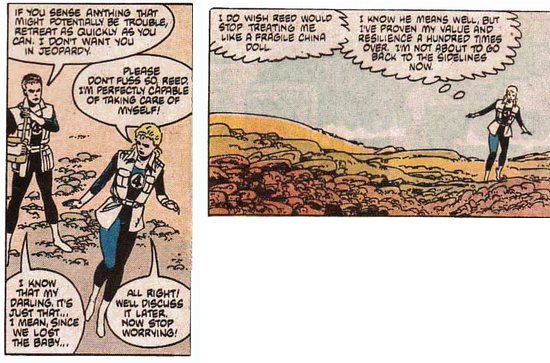
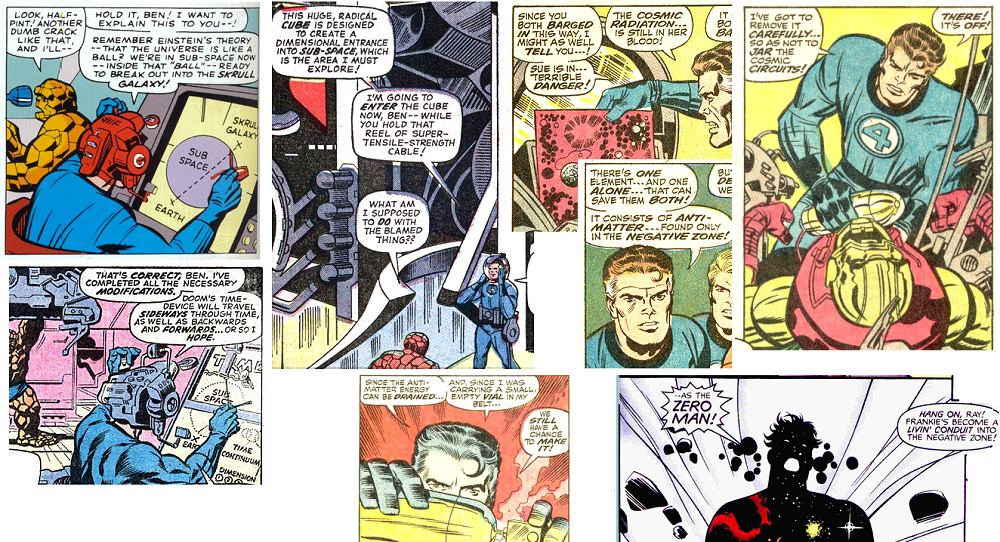


We are approaching the end of the five act story. All the major subplots approach their conclusion. Perhaps the biggest and most complex subplot is the war between alien empires the Kree and the Skrulls. Obviously this will take some time to settle, so this settling begins early. It will be completed in next year's annual.
Conflict versus cooperation
A major theme of the 28 year story is that cooperation is better than conflict. This is the central truth for any empire, any family, or any nation (such as America: this is the Great American Novel):
The annual also represents the final calm before the final storm. The remaining issues of act 4 will be unprecedented disaster followed by unprecedented disaster:
Annual 18 and X-Men 137
Page 1 starts with a banner headline that indicates 10 months passing since X-Men 137, one of the most important comics in the history of Marvel (the death of Phoenix). This is significant for a number of reasons:
This all links back to F13, the issue where Reed finally reaches the
moon and meets higher beings. You don't need to study this deeply to see
the links: just look at the art (thanks for the "WaitWhat" podcast for the scans)

Annual 18 reflects the cold war politics of the time: The USSR was
effectively bankrupt and commentators could see the end of the cold war
is in sight. They just didn't know if it would be violent or peaceful.
The battle between the lone Kree and Skrull warriors began in X-Men 137
where Phoenix died. The conflict begins to be resolved. Phoenix then
returns a few weeks later (the time), just as the FF return from the
events of annual 19. They then discover that the Phoenix cocoon is
giving off some kind of radiation. Is the timing coincidence? Presumably
this change on the ages old conflict was felt on some fundamental level
through the universe, just as the field that ended the Skrull
stretching abilities in annual 19. Why does this matter to the big
story? Because this was a major change in comics, reflecting the end of
the cold war. The friendship between a Kree and a Skrull warrior
reflected the end of the cold war, and so the end of the cultural
driving force behind the Great American Novel.
X-Men 137 is perhaps the best known example of the success of Marvel. It
is the key story that launched the X-Men into record breaking sales,
making it the keystone of the money-first comics of the 1990s. The
success of the Marvel Universe (a by-product of the Fantastic Four)
meant comics were profitable. But the greatest short term
profit always comes from merchandising. This in turn led to a fear of
change. The return of Phoenix was the first sign that time was not
merely slowing down (as it had since the birth of Franklin in 1968)
but would completely stop and even go backwards. The return of Phoenix
in FF286 was the first break in the dam, and in a few years a flood of
resurrections and retcons would mean the death of realism. For the
context see the page on the death of the Marvel Universe.
X-Men 137 was cover dated Sep 1980, the same as FF222 (the possession of Franklin). This annual takes place just before FF274, cover dated January 1985. Page one says ten months have passed, so 1980-85 is only 10 months, Marvel Time. This is consistent with the dating suggested elsewhere on this site:

